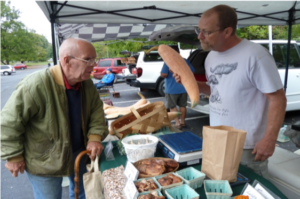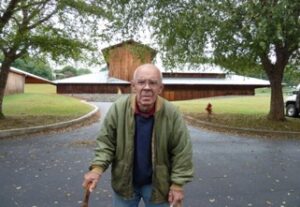Author: Angela Mucci —
Clyde resident Ron Hall was walking across his yard last May when “My whole life changed in 2 seconds,” he stated while interviewing him at the Haywood Historic Farmers Market. He was enjoying the warm weather and looking at the sky when his foot caught in a string of English Ivy. “I thought English Ivy only grew on buildings, but its roots go deep into the ground. That plant didn’t budge at all, so down I went. One second I was walking, the next I couldn’t move.”
What used to be a life of traveling the world, lecturing about antiques, paintings, pottery, Japanese ceramics and fine art changed to a life where “I don’t leave this county too much.” Ron had learned about antiques and art from his family while growing up and spent years giving lectures primarily to senior citizens across the country. Now that “I’m made of titanium from my shoulder to my tailbone,” said Ron with a chuckle, it’s harder for him to get around.
With limited income, no family, injuries and fading eyesight, Ron found himself in a situation he had not been in before. “I’m 77 years old. I have to ask for help now. Fortunately, there are people who have helped me get food, firewood, and oil. I’ve been able to make it through.” In times past, villages often took care of people when they were in times of need, with the understanding that any one of us can find ourselves in a vulnerable situation. Due to the nature of our modern-day busy lives where people may not even know their neighbors, community programs can make the difference between life and death for struggling citizens. The local church is one place where Ron has found fellowship and people who like to check on him. He also utilizes the local Meals on Wheels organization, getting regular food deliveries.
Another program which has carried Ron through tough times is the Double Up Food Bucks (DUFB) program. Originally started in Michigan, the founders had a mission to make fresh produce more affordable for people with low-incomes while also supporting farmers and local economies. MountainWise has expanded DUFB here in Western North Carolina, partnering with local farms, grocery stores, and markets to make healthy food more accessible. Grants from the Community Foundation of WNC and Mission Health have funded the program so far, making it possible for DUFB to reach 665 people over the last two years.
Market Manager for the Haywood Historic Farmers Market, Britt Cannon, explained how it works: “Customers get a wooden coin as a SNAP [formerly called food stamps] benefit. MountainWise matches up to $20 worth of tokens, so customers can spend up to $40 per market day. Matched tokens can only be spent on produce, allowing the customer to stretch their SNAP benefits and purchase more fruits and vegetables than they could otherwise afford. The vendors cash in their wooden tokens at the end of the day and get a check in the mail.” The same model of matching up to $20 of SNAP money is used at all participating businesses.
It seems like the DUFB website is right in stating “The wins are threefold: low-income consumers eat more healthy food, local farmers gain new customers and make more money, and more food dollars stay in the local economy.” What do local vendors think of the DUFB program?
KT of KT’s Orchards in Canton is always happy to see Ron and to sell him some apples: “This plan here gives people from all walks of life a way to get something fresh. You’ve got to serve everyone; you don’t want to just serve certain people. We see mostly elderly people using it on Saturday, but it’s for anyone who is not as privileged as some. You take for granted being able to go into the supermarket and getting whatever you want. Not everyone has that option. He wants fruit. He wants vegetables. He wants the things you want. He just wants to be able to afford them. Here you can buy Saturday and cook through at least the middle part of the week. How nice is that? That’s how wonderful this is.” Owner of Smoky Mountain Mushroom Jason Pryor commented that roughly half of his customers use the DUFB coins, which brings him more business and “it’s good because then people get to use local ingredients.”

Ron Hall shopping at Haywood Market.
Regional Health Promotional Specialist, Abby Holmes, organizes the DUFB program for MountainWise. She commented that local stores, vendors and farms are eager to partner with DUFB. “Choosing to offer DUFB means you are contributing to healthy eating for low income customers, increasing income for local farmers, and keeping money in the local economy.” In addition to providing funding for partnering businesses, MountainWise also offers logistical support, marketing, and outreach, which helps drive more low-income customers to the store or market.
Staying Curious and Trying New Things
The DUFB program often encourages people to eat healthy and to try new foods. Ron was never a big tomato eater before using DUFB and now he craves them for his sandwiches. “When I can find them I use tomatoes and cucumbers for the main part of the sandwich and love to add some mayonnaise and honey mustard. It’s a new favorite.”

Ron Hall outside the market.
Ron added that the past year and a half has been an adjustment and he has drawn on lessons from his Dad for inspiration. “My Dad taught me to be adaptable, and to stay open to learning about new things.” Ron may not be able to get around the way he used to, but he still spends his time learning about things online or from books and from the people he meets at the farmers market. “Going there is like the social event of the week. I like to see people and find out what they are up to.” Curiosity about new people, places and things, he says, is also something he learned from his Dad. “It has carried me well.”
Going Forward
The Haywood Farmer’s Market closes for the season from November – March. Ron will miss the social interactions as well as the fresh tomatoes. “I’ll just have to get through, without” he says. “Hopefully we will have an early Spring.” In the meantime, he will continue to attend church, get nutrition from Meals on Wheels and stay warm with his cat named Beep Beep through the Winter.
As for the future of the DUFB program, MountainWise organizer Abby Holmes states: “We have received a 4 year USDA grant to expand DUFB to several more farmers markets, grocery stores, online food hubs, and mobile markets throughout the region. However, we will continue to rely heavily on local funding sources to help expand DUFB even further. MountainWise has a goal to see DUFB offered at every food retailer in Western NC “as a means to fighting food insecurity and strengthening our food system.”
Did you Know?
- Almost one-third of food insecure seniors are disabled.
- Nearly one in every five seniors living with grandchildren is food insecure.
- 17% of African American seniors and 18% of Hispanic seniors are food insecure, compared to 7% of Caucasian seniors.
- 9 of the 10 states with the highest rates of senior food insecurity are in the south.
- $1 billion in SNAP benefits would generate 8,900 full-time jobs.
- DUFB has benefited more than 300,000 low-income families and more than 1,000 farmers.
For more information or to partner with DUFB, contact Abby Holmes at: abby@mountainwise.org
To find a DUFB location near you go to: https://www.doubleupfoodbucks.org/locations/
To find out about local food resources visit: https://www.mannafoodbank.org/where-to-get-help/
Did you Know facts from: https://www.ncoa.org/news/resources-for-reporters/get-the-facts/senior-hunger-facts/ and http://www.doubleupfoodbucks.org/
